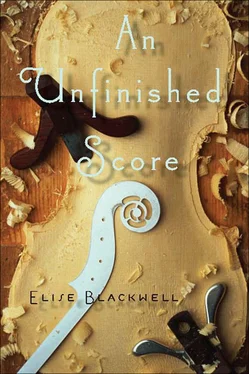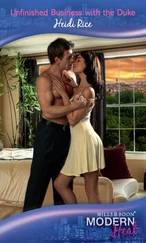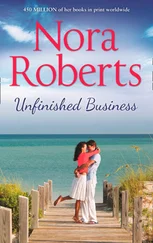Olivia and Petra say nothing to each other, not even to exchange names or some pleasantry about the music or the food, until Petra says, “Do you know the story of Tomaso Albinoni?”
“Excuse me,” Olivia says and leaves as though Petra has said nothing at all.
Petra maneuvers Suzanne to a corner of the room. “I was wrong.”
For a moment Suzanne thinks she is talking about Ben, but she quickly understands that she means Olivia. “You can’t let her take the concerto to a major symphony. When I told you to do what she said, I thought it was ending here.”
“What about exploding my life, being at her mercy?”
“Bad advice. I underestimated her. I hadn’t seen her yet. She’s … she’s … I don’t know, maybe just really, really angry. More than I thought. Now I think you have to stop this all and get away from her. Whatever happens, enough is enough. You can’t take that to a symphony and say that Alex Elling wrote it, and you should never play it again.” Petra’s eyes are wider than normal, and she continues to nod as though she will nod until Suzanne agrees, however long it requires.
Suzanne looks into Petra’s sea-blue eyes, looks at her soft mouth, her sharp curve of cheekbone, her neck, her shoulders. Her best friend. She wants to believe in her, in Ben, in herself, to choose to trust, to believe the words of the people who love her and not the people who wish her harm. The person who wishes her harm. She begins to nod with Petra.
After scanning the room, Suzanne makes her way to the corner where Olivia is talking to Lisa-Natasha.
“Please leave,” Suzanne says, and her glare shuts down whatever half-clever remark Lisa-Natasha was about to zing her with.
Suzanne turns her back to the room, facing Olivia, who moves her glass of champagne from one hand to the other. Her composure seems to have returned, and the sequined jacket that looked gaudy in the hall when the lights went up looks more understated, sophisticated in soft light.
“Which quartet is that?” Olivia asks as the quartet starts a piece by Beethoven.
“A late one.” Suzanne says, refusing to have her line of thought pulled away. “About Chicago. It’s true that they might be interested in Alexander Elling’s only work, but they won’t be interested in the concerto. You’ll soil his name, and yours, not just mine.”
Olivia straightens herself to her full height and looks at Suzanne by casting down her eyes. “Do you think it isn’t good enough? Did you fail to notice the standing ovation?”
Everything behind Suzanne softens, even the sound of the strings. “That was a generous audience clapping for a respected dead man after being warmed up by student compositions.”
“That’s not a very nice thing to say to me.” Olivia’s eyelids are half lowered, giving the effect of disdain but also of boredom — an inability to concentrate on words that are not admiring.
Suzanne does not know whether Olivia is feigning denseness or whether she has been genuinely blinded by her obsession and twisted success. “You never answered my friend’s question about Tomaso Albinoni,” Suzanne says, “Do you know the story? His most famous composition, the only one in anyone’s repertoire, is the Adagio in G minor.”
Olivia sips her champagne, now opening her eyes fully.
“And do you know when it was written?” Suzanne asks.
Olivia waits, never breaking eye contact.
“It was written in 1958,” Suzanne says. “Albinoni died in 1751. Seventeen fifty-one.”
Olivia still does not speak, so Suzanne continues. “It was written by Remo Giazotti, who after he was found out claimed the piece was based on Albinoni fragments. Maybe it really was, or maybe not at all, but Albinoni didn’t write that adagio.”
At last Olivia speaks, and vehemently. “It’s not the same at all. All you did was some of the orchestration. Yes, you wrote some bits, the bassoon line, of course, and those stretches of cello. Brilliant, actually, but don’t delude yourself that you wrote this.”
Now Suzanne knows that Olivia’s dimness is theatrical, a desperate performance depending on the slivered chance that Suzanne doesn’t really know. Suzanne says, “I know I didn’t write the concerto, Olivia. And neither did Alex.”
Olivia watches her, her stare fierce and wild, the look in her eyes that of an animal deciding whether to attack or take flight.
“Did he ever write any music at all?” Suzanne asks.
Olivia exhales, and her mouth goes slack. “You were right in the first place. He was never fond of concertos, and he would have told you if he was writing music. He would have shown you. You should have trusted your instinct. You should have trusted him .”
Suzanne changes the angle of her stance and steps back until she finds the wall. She leans her head back, resting it so that she can look up into ornate rafters striping the ceiling. “Months,” she says. “For months I thought I was in his mind, that I was getting closer and closer to him, learning more about him. That I was playing what he wrote for me. That I was with him again.”
She glances at Olivia, who faces her, arms crossed and chin lifted — a gesture not of defeat but of triumph.
Olivia’s voice is at once deep and hissing, a tone Suzanne has never heard and does not want to ever hear again. “That’s right, and all that time you were in my mind, playing my part, feeling how you made me feel. From now on, when you think of him you will also think of me.”
The several hundred people in the room seem distant, separated from them by an ocean of air, their voices blending into a faraway hum. Suzanne shudders as she closes her eyes, lets the remaining image of low lights spin. Everything Olivia claims is true.
“Yes,” Suzanne says, her eyes still closed, her head depending on the wall for support. “I thought I was in his mind, but I was in yours.” She pauses before adding, “I promise you, it’s a terrifying place.”
Olivia’s voice is right in her ear, moist. “If you met him tomorrow, would you do it all over again?”
Suzanne breathes in the question and turns it slowly, wishing she could give a true answer to herself. She pushes out from the wall, standing straight, a small but quick movement that startles Olivia.
When she recomposes herself, Olivia says, “I would do it all over again. I don’t have to think about it for a second.”
Suzanne feels stripped down to something simpler than emotion, in a place where honesty is all that is possible yet has little value. As she walks away, she hears Olivia say, “I took something away from you, but I gave you something, too.”
The noise of the party blends, the individual sounds of quartet, voices, cutlery, feet melting into a homogeneous buzz, farther and farther away.
As Suzanne sits outside, in front of a hotel that could be in any of the cities she shared with Alex but instead is in one she barely knows, she pictures herself at home, in command of keyboard and paper, composing her first serious piece. It will be something modest in its ambitions, perhaps, but whole and hers from first measure to last. She imagines completing that last bar and bringing the score to Doug so he can tell her who she is.
Tomorrow she will fly home, and when she crosses the threshold of their house, she will find Ben, hunched over a cello, as though it is a child he is protecting from breaking waves. While the instrument stays silent, his long fingers will move along the strings and his foot will tap time. When he looks up, Suzanne will be unnerved by the dark eyes staring straight at her from under lashes so fair they are nearly white. She will take a seat across from him and say, “Really play it, full volume,” and he will close his eyes and play a sonata — delicately layered, low and graceful, lovely and sad. In the music she will find the desire to tell him as much as he wants to hear, and, if he is willing, they will not start over but continue, a better variation on what they are.
Читать дальше












